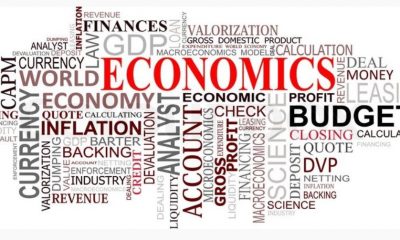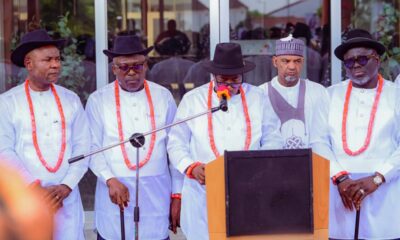Oil & Energy
Hemispheric Implications Of Chavez’s Illness
The recent dramatic pronouncement that Venezuelan President, Hugo Chavez, underwent cancer treatment in Cuba reverberated far beyond Venezuela, depressing his allies and elating his enemies.
While the leader of his self-proclaimed “Bolivarian revolution” is second only to his good buddy Fidel Castro in Washington’s black book, the fact remains that Chavez has discreetly deployed Venezuela’s vast oil and cash reserves to assist the struggling economies of a number of his Central American neighbors, which has earned him deep gratitude.
Ever the showman on alert for any opportunity to tweak Uncle Sam’s snout, in March 2006 in the aftermath of Hurricane Katrina, which damaged the U.S. Gulf oil infrastructure sending domestic prices soaring, he offered shivering New England residents discounted heating oil, infuriating the Bush administration.
Venezuela has the largest conventional oil reserves and the second-largest natural gas reserves in the Western Hemisphere.
But the reality is that Venezuela remains the United States’ fourth largest oil importer, accounting for roughly 1.5 million barrels a day. Should Chavez ever in a fit of pique turn off the taps, the only option that the US would have to replace lost imports would be to turn to Saudi Arabia, the sole OPEC member, and ask them to ramp up production, as Saudi Arabia is the only OPEC member with the reserve capacity to do so.
This in turn would create political problems for Riyadh with other OPEC members, most notably Iran, as under the OPEC system each member state has a pumping quota, and Tehran has already accused Riyadh of breaching its quotas by stealth.
Chavez certainly has reason to be mightily annoyed with US policy, which has been turning up the pressure on Chavez for years while carefully calculating how to avoid a total rupture.
In 2005 Washington classified Venezuela as a country that does not “cooperate in the fight against drug trafficking,” with government officials stating that the lack of assistance should incur financial penalties. The following year the U.S. upped the ante, labeling Venezuela as a country that “does not cooperate sufficiently with the fight against terrorism” and imposed sanctions prohibiting US arms sales to Venezuela or those from any company in the world using US technology.
Upping the ante, in 2007 Chavez announced the nationalization of the country’s oil industry. The foreign oil companies were forced to sign agreements giving majority control of hydrocarbons projects to Petroleos de Venezuela, S.A. (PDVSA), Venezuela’s state-owned petroleum company. Projects owned by companies like ConocoPhillips and ExxonMobil, who failed to sign these agreements, were taken over by PDVSA.
US-Venezuelan relations proceeded to deteriorate rapidly.
Most recently, on 24 June, during the “Sanctionable Activities in Venezuela” hearing in the House of Representatives Foreign Relations Committee, a number of Democratic and Republican House members requested that the Obama administration take more aggressive action against the government of Hugo Chavez. Sub-Committee on Foreign Affairs for the Western Hemisphere head, Connie Mack, a Florida Republican, called the Venezuelan government “terrorist,” adding, “it’s time to act to contain the dangerous influence of Hugo Chavez and his relations with Iran.”
Pandering to the committee members, In testimony before the Committee, the State Department’s Assistant Under-Secretary of State for Latin America, Kevin Whitaker, stated that the administration is “seriously considering” labeling Venezuela a “terrorist state. No option is off the table and the Department will continue to study any further action as may be necessary in the future.”
Washington’s sanctions policy has isolated Cuba and crippled its economy for over fifty years, a relic of a long-gone Cold War.
It appears that Hugo Chaevz’s mortal sin in the eyes of Washington is that he did not come from Venezuela’s traditional white criollo population, less than 25 per cent of the country’s population, which had dominated Venezuela’s politics since the nation achieved independence in 1811. Chavez came instead from the country’s mestizo ethnicity, of mixed European, African, and Amerindian ancestry, which comprises about 65 percent of the country’s population and a working-class background.
Just as Obama smashed the color bar in US politics by being elected to the country’s highest office in 2008, Chavez, elected President in 1998, gave the majority mestizo non-white population not only of Venezuela, but of other nations across Latin and Central America, high hopes that one of their “own” could be elected, who would be more sensitive to their needs than their traditional white criollo elites (of whom his friend Fidel Castro is one), a political seismic shift of historic proportions.
As Washington remained fixated after 11 September 2001 on invading Iraq and Afghanistan, this political shift began to wash across Latin America, most notably with the 2006 election of Bolivia’s Evo Morales.
More important than the ethnicity of the chief executive, however, is that since the early 2000s left-wing political parties have risen to power in most Latin American countries. Besides Chavez and Morales these include Lula da Silva and Dilma Rousseff in Brazil, Fernando Lugo in Paraguay, Nestor Kirchner and his wife Cristina Fernandez in Argentina, Tabare Vazquez and Jose Mujica in Uruguay, the Ricardo Lagos and Michelle Bachelet governments in Chile, Daniel Ortega in Nicaragua, Manuel Zelaya (later deposed in a coup) in Honduras, Rafael Correa in Ecuador, and Mauricio Funes of El Salvador.
Chavez has been at the forefront of attempting to wean these governments away from Washington’s influence, most notably with the establishment of the Alianza Bolivariana para los Pueblos de Nuestra America (the Bolivarian Alliance for the Peoples of Our America,” or ALBA), which Chavez first proposed in 2004. The initial member states were Venezuela and Cuba, but ALBA now also includes Bolivia, Dominica, Ecuador, Nicarauga and the St. Vincent and the Grenadine islands. In August 2008, shortly before the coup, which overthrew him, Honduran President Manuel Zelaya signed an agreement to join ALBA. Further threatening Washington, in October 2009 ALBA leaders agreed a cereate a regional currency, the sucre, to used used in alliance transaction in lieu of both local currencies and the dollar.
Is it any wonder then why Washington sees Chavez as a threat?
Accordingly, the 64,000 bolivares question, not only for Venezuela but Central America and the U.S. as well is – how serious is Chavez’s illness, and what are the implications for Caracas if he is incapacitated? If Chavez leaves the scene, will a new government continue his policy of providing discounted energy to his poor neighbors, most notably Cuba, which receives 64,000 barrels a day, or the Dominican Republic, which pays Venezuela for the 50,000 oil barrels per day that it receives through Petrocaribe with chicken, lard, sugar and pasta? Nicaraguan businessmen are so concerned with the “precarious health” of President Chavez that they are insisting that the Ortega administration immediately negotiate a Free Trade Agreement with Venezuela. If Chavez leaves office, will these countries become more amenable to foreign investment, having nowhere else to turn?
Will a new administration let foreign oil companies back into Venezuela? These and many more questions hinge on the health of a single man, who whatever happens has had more impact on the Latin American political landscape than any other regional political leader of the last dozen years. Love Chavez or detest him, it is impossible to ignore both the man and his impact and the smart money will be gauging carefully the depth and longevity of the impact of the man and his vision should he leave the stage.
Daly writes for OilPrice.Com.
John Daly
Oil & Energy
Bill Prohibiting Gas Flaring Passes 2nd Reading

The Bill for an act to prohibit gas flaring, encourage commodity utilisation, and provide for penalties and remedies for gas flaring violations has passed its second reading in the House of Representatives.
Sponsored by the Member representing Ikorodu Federal Constituency (APC, Lagos), Babajimi Adegoke Benson, the bill seeks to prohibit the flaring and venting of natural gas, except in strictly regulated circumstances, while encouraging the utilisation of gas resources to foster economic growth and energy generation.
The proposed legislation aims to mitigate the environmental, health, and economic impacts of gas flaring, aligning Nigeria’s oil and gas operations with international climate change commitments.
Offenders, who violate the provisions of the proposed law, would face stringent penalties, including fines of $5 per 1,000 standard cubic feet of gas flared and potential suspension of operations for repeat violations.
Leading debate on the general principles of the bill, Benson said gas flaring has plagued Nigeria for decades, resulting to severe environmental degradation, public health crises, and economic losses while it environmentally, contributes to greenhouse gas emissions, global warming, and acid rain, exacerbating climate challenges.
The lawmaker said public health impacts of the practice are equally dire, as pollutants from gas flaring cause respiratory and cardiovascular diseases, particularly among residents of communities close to flaring sites.
According to him, economically, flaring results in the waste of a valuable resource that could otherwise be harnessed for energy generation or exported to generate revenue.
Benson insisted that the bill was designed to address those issues while bringing Nigeria in line with global standards such as the Paris Agreement on climate change.
“The bill provides for a comprehensive prohibition of gas flaring except in emergencies or when explicitly authorised by the Nigerian Upstream Petroleum Regulatory Commission (NUPRC).
“Operators are required to submit and implement Gas Utilisation Plans, detailing how gas that would otherwise be flared will be captured, processed, or commercialised.
“Offenders, who violate these provisions, face stringent penalties, including fines of $5 per 1,000 standard cubic feet of gas flared and potential suspension of operations for repeat violations. Furthermore, the Bill ensures that communities affected by gas flaring are entitled to compensation and environmental restoration, creating a mechanism for redress.
“Transparency and accountability are integral to the enforcement framework of this Bill. Operators must submit regular reports on gas flaring incidents, which will be audited and made publicly available by the NUPRC. This approach ensures public oversight and stakeholder engagement, fostering trust and compliance.
“Nigeria’s adoption of this Bill positions the country to emulate such success, ensuring a balance between environmental stewardship and economic development.
“The implementation of this Bill will be overseen by the Nigerian Upstream Petroleum Regulatory Commission, which will monitor compliance through regular audits, enforce penalties, and facilitate gas utilisation projects in collaboration with operators and development partners.
“The Anti-Gas Flaring (Prohibition and Enforcement) Bill, 2024, is a timely and necessary response to one of Nigeria’s most pressing environmental challenges. Its provisions are both practical and forward-looking, addressing immediate concerns while laying the groundwork for a sustainable future.
“I urge all Honourable Members to support the Second Reading of this Bill as a demonstration of our collective commitment to environmental protection, public health and economic progress”, he added.
###
Oil & Energy
‘Indigenous Companies To Gain From Shell’s Contract Awards’

Oil major, Shell, has restated its commitment to the development of Nigerian companies through contract awards and scaling up of expertise.
Managing Director, Shell Nigeria Exploration and Production Company ((SNEPCO) Limited, Ron Adams, made the remark while speaking at the Opening Ceremony of the 13th edition of the Practical Nigerian Content forum held in Yenagoa, Bayelsa State, with the theme “Deepening the Next Frontier for Nigerian Content Implementation”.
Represented by the Manager, Business Opportunity, SNEPCO’s Bonga South-West Aparo Project, Olaposi Fadahunsi, he said several benefitting companies had taken advantage of the patronage to expand their operations and improve their expertise and financial strength.
Adams said, “Shell companies execute a large proportion of their activities through contracts with third parties, and Nigeria-registered companies have been key beneficiaries of this policy aimed at powering Nigeria’s progress”.
He emphasized that Shell companies in Nigeria also continued to develop indigenous manpower through scholarship programmes with over 3,772 undergraduate and 109 Niger Delta post graduate scholarships since 2016.
“As we speak, beneficiaries of the 13th edition of the Niger Delta Post Graduate Scholarship awards are pursuing their studies in the United Kingdom. The employability rate of the scheme is high with over 98% of the graduates who won the awards securing employment in the oil and gas industry, academia and Information Technology, among other sectors, within one year of completing their studies”.
He commended the Nigeria Content Development and Monitoring Board (NCDMB) for ensuring compliance with the Nigerian Content Act saying “Nigerian content will continue to be an important part of Shell operations”.
The four-day conference hosted by the Nigerian Content Development and Monitoring Board (NCDMB) and participating companies reviewed progress on the development of Nigerian content pertaining to the implementation of the Nigerian Oil and Gas Industry Development (NOGICD) Act since it was enacted in 2010.
Shell companies in Nigeria are among the more than 700 oil and gas entities that participated in the forum with a strong message of support for Nigerian companies, having awarded contracts worth $1.98 billion to the businesses in 2023 in continuing effort to develop Nigerian content in the oil and gas industry.
Oil & Energy
NNPC Begins Export From PH Refinery

The Nigerian National Petroleum Company Limited (NNPCL) has sold the first cargo of Port-Harcourt low sulfur straight run fuel oil (LSSR) to Dubai-based Gulf Transport & Trading Limited (GTT).
The company is expected to load the cargo in the coming days onboard the Wonder Star MR1 ship, signalling the commencement of operations at the plant and the exportation of petroleum products.
The ship would load 15,000 metric tons of the product, which translates to about 13.6 million litres.
Although the volume coming from the NNPC into the global market is still small, the development has the potential to impact the Very Low Sulphur Fuel Oil (VLSFO) benchmarks in the future, while changing the market realities for Atlantic Basin exporters into Nigeria and other regions.
The sulfur content of the export by NNPC stands at 0.26 per cent per wt and a 0.918 g/ml density at 15°C, according to Kpler, a data and analysis company.
The cargo was reportedly sold at an $8.50/t discount to the NWE 0.5 per cent benchmark on a Free on Board (FOB) basis.
Kpler reported that the development would help displace imports from traditional suppliers in Africa and Europe, as Nigeria’s falling clean product (CPP) imports are already decreasing, dragging imports into the wider West Africa region lower as well.
-
Business11 hours ago
Oil Production Resumption: Ogoni Youths Seek Inclusion In FG’s Plans
-

 News13 hours ago
News13 hours agoSenate Reshuffles Committees, Appoints New Chairmen For Dev Commissions
-

 Nation11 hours ago
Nation11 hours agoBizman Alleges Threat To Life …Seeks Police , Govt’s Intervention
-
Rivers11 hours ago
NOSDRA D-G Disburses N150m To 300 Farmers In Rivers
-

 Niger Delta10 hours ago
Niger Delta10 hours agoOgoni Postgraduate Forum Tasks HYPREP On Scholarship Scheme
-
Business11 hours ago
NCDMB Assures Greater Local Industry Participation In Oil, Gas Projects
-

 News13 hours ago
News13 hours agoNigeria Strengthens Economic Ties With Germany To Boost Investment, Jobs
-

 Featured10 hours ago
Featured10 hours agoFubara Flags Off Upgrading Of 135 Primary Healthcare Facilities In Rivers

